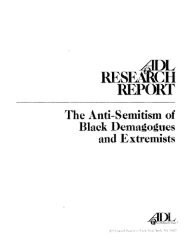Create successful ePaper yourself
Turn your PDF publications into a flip-book with our unique Google optimized e-Paper software.
\<br />
~ the national defense informJ::ln in this case were ISraeli d~rnats. But, in fact, a<br />
Q prosecution of this kind is unprecedented~<br />
Far from alleging the two aipac o!ficials were foreign agents, u.s. Attorney Paul McNulty<br />
is contending that the lobbyists are legally no different than the government officials<br />
they lobbied, holding Rosen and Weissman to the same rules ~or protecting $ecrets as<br />
Franklin or any other bureaucrat with a security clearance. The indictment even says that,<br />
because Rosen long ago held a security clearance wben he worked as an analyst for the rand<br />
Corporation, he was duty-bound to protect any classified information be came across after<br />
the clearance expired--on JUly 6, 1982. "steve Rosen and Keith Weissman repeatedly sought<br />
and received sensitive information, both classified and unclassified, and then passed i~<br />
on to others in order to advance their policy agenda and professional standing," the u.s.<br />
attorney said at a press conference announcing th~ indictment.<br />
aut, if itls illegal for Rosen and Weissman to seek and receive "classified<br />
,informat.ion, It t.hen many invE}stigative journalists a~e also .crimi.nals--not. to mention<br />
~ormer government. officials who w~ite for scholarly journals or t.he scor;es of men and<br />
women who petition the federal government on defense' and foreign policy. In fact, the<br />
leaking o~ classified information is routipe in Washington, where such data is traded as a<br />
kind of currency. And, while most administrations have tried to crack down on leaks; they<br />
have almost always shied away from going after those who rece~ve tbem--until now. At a<br />
time when a growing amount o~ information is being classified, the pr;osecution of Rosen<br />
and Weissman-threatens to have a cbilling effect-~not on the ability of fore~gn agents to<br />
~n~luence U.S. policy, but on the ability of the American public to understand it.<br />
Since tbe inception of tbe national security state, tbe ~ntelligence commun~ty has<br />
worried that ou~ free press is a security risk. In an ~nterview in<br />
1954 with U.S. News and World Report, under the headline "we tell the russians too much,"<br />
CIA Director Allen Dulles remarked, fIr would give a good deal if I could know as much<br />
about the Soviet Union as the Soviet Union can lear;n about us merely by reading the<br />
p~ess."<br />
Nonetheless, the federal governmen~ has tradit~onally resp~cted an implicit First<br />
Amendment right of publishers and private citizens to determine the public's right to<br />
know about national security~ Without journalists' ability to disclose secret information,<br />
the executive branch would be the sole' arbiter of what information the public could have<br />
about its government's foreign policy. .<br />
And, when the public. j.,s kept. ,in the aa~k, it! s hard to combat excesses. For example, it.' s<br />
unlikely tbat the Pentagon would have taken steps to correct abuses in its detention<br />
facilities had "60 Minutes II" not obtained photographs of naked prisoners stacked in a<br />
pyramid at Abu Ghraib. Had u.s. law been similar to the British Official Secrets Act,<br />
which gives 10 Downing Street the autbority to prosecute journalists fo~ disclosing<br />
classified materia~, itls unlikely the pUblic. would know about the network of contractors<br />
responsible .for t,be rendition of terrorists to nations t.bat.. tor~ure prisoners or the<br />
internal debates within the Bush administration ~egarding the application of the Geneva<br />
Convention. To be sure, the~e are cases in which the press could do great harm to national<br />
security, sucn as publishing the details of how we keep $u~ve~llance on our enemies. But,<br />
as any reporter who cove~s these matters will tell you, most of the timejou~nalists<br />
negotiate an agreement.--without. the threat of prosecu~ion--on how to report. $ensitive<br />
material in a way that minimizes harm to intelligence-gathering and military operations.<br />
"We've al~ held back information when a responsible government official makes a compelling<br />
case that it.'.s 90in9 to cause some damage," says Newsweek reporte~ Michael Isikoff.'<br />
And, wbile every administration has ~ade internal efforts to go afte~ leakers, criminal<br />
prosecutions have been extremely rare~ In the two major anti-leaking cases invo~ving<br />
classified secrets brought in the last 35 years, both leaker~ were prosecuted for slipping<br />
government proper;ty to reporters. In the case of Daniel Ellsberg, it was a classified<br />
history of the deliberations of three adm~nistrations regarding Vietnam known as the<br />
Pentagon Papers; jn the case of Samuel Mo~ison (the only succes$ful ant~-~eaking<br />
prosecution)" it was classified aerial photograph$ of a Soviet. naval aircraft carrier,<br />
which he provided to Jane's Defence Weekly. No one has ever been prosecuted--as Rosen and<br />
Weissman currently are--tor conveying national security info~mation orally, with no<br />
documents involved. -<br />
Steve Pomerantz, the former chief of counterterrortsm fo~ the FBI, says that his<br />
division--which, in the early I~OS, also investigated classified disclosure cases--never<br />
got very !ar in their inve$tigations. "I! you look at this as a conspiracy, then there are<br />
two part.ies:, t.he le~ker and the reporter," he says.<br />
2




